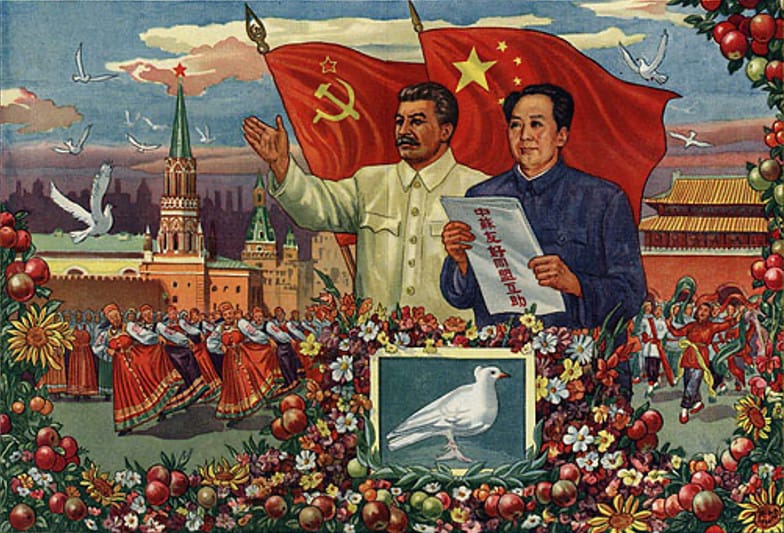Russia Says Its China Ties Now Closer Than During the Stalin-Mao Era
China said the same last month

Editor’s note: Not actually true. (Soviet transfers to China 1949-1953 were massive.) Still notable that the pair is opting to say so.
Russia and China have hailed a growing strategic partnership they say exceeds even those forged by competing powers during the Cold War, a sign of even closer ties between Moscow and Beijing as the U.S.-led NATO Western military alliance increasingly focused on the pair.
Russian Foreign Minister Sergey Lavrov and Chinese Foreign Minister Wang Yi met Thursday on the sidelines of the “Central and South Asia: Regional Connectivity. Challenges and Opportunities” international conference in the Uzbek capital of Tashkent.
Following their discussions, the Russian Foreign Ministry issued a readout saying, “Both sides voiced a positive assessment of the dynamics of the development of Russian-Chinese relations” and that the two top diplomats “stated that the existing bilateral ties surpass such a form of interstate interaction as military-political alliances of the Cold War era.”
This notion previously appeared in a joint statement adopted late last month by Russian President Vladimir Putin and Chinese President Xi Jinping to commemorate.
Lavrov separately highlighted these words, along with his Chinese counterpart’s assessment of ties between the nations being “the best in history” as they commemorated the 20th anniversary of their countries’ Treaty of Good-Neighborliness and Friendly Cooperation in remarks Thursday.
“I would also like to single out the words from this statement that say that our ties now surpass such a form of interstate interaction as the military-political alliances of the Cold War era,” Lavrov said. “This is the most important guideline for deepening relations between Russia and China in all areas without exception.”
The concept was further emphasized by Vitaly Fadeev, a senior counselor at the Russian Embassy in China, in a video message Thursday.
“The Russian-Chinese relations surpass the traditional military-political alliances when it comes to their effectiveness and stability, with the flexibility that helps support this format of relations,” Fadeev said, according to the state-run Tass Russian News Agency.
The Cold War, largely dominated by the Washington-Moscow rivalry that gave rise to the rival NATO and Warsaw Pact blocs, was also a tumultuous time for relations between the Soviet Union and the People’s Republic of China. While the fellow communist powers were initially aligned, they fell out in the 1960s and only truly began to explore a more in-depth relationship after the collapse of the USSR.
Putin, who was still president for the signing of their treaty some two decades ago, has increasingly seen benefits in building ever-robust ties with Xi as both men’s relationships with the West sour. While they’ve both dismissed the notion of any formal alliance, they have intensified economic, military and political cooperation at an unprecedented rate.
During their talks Thursday, Lavrov and Wang discussed a range of regional and international issues including information security, the situation in Central Asia and the Asia-Pacific region and the 2015 nuclear deal with Iran, according to the Russian Foreign Ministry.
The agreement is also supported by the European Union, France, Germany and the United Kingdom, but the U.S. abandoned it in 2018 under former President Donald Trump, whose successor, President Joe Biden, is attempting to revive participation during ongoing talks in the Austrian capital in Vienna.
Lavrov and Wang also discussed Afghanistan, to which “particular attention was paid,” according to the Russian readout. The impending end to the two-decade U.S.-led war there has raised concerns over the country’s future stability and both Moscow and Beijing have sought to ensure a stake in preventing the situation from spiraling out of control with regional consequences.
China-Russia cooperation has also weathered the COVID-19 pandemic. Also on Thursday, Georgy Zinoviev, director of the Russian Foreign Ministry’s First Asian Department, discussed the pace of trade between Moscow and Beijing.
“Last year, the dynamics in this area [trade] was naturally negatively affected by the coronavirus pandemic, which led to some, but not a radical decline in mutual trade,” Zinoviev said, according to Tass. “However, now we are witnessing a rapid recovery in its volume, which gives reason to count on reaching new record trade figures this year and, in the long term, reaching the target of $200 bln set by the heads of state.”
The growing depth and breadth of Russia-China relations have caught the attention of NATO, which has not only persisted but expanded in the post-Cold War era. The now-30-member mutual defense pact has nearly doubled in size since its 1949 inception and now includes a number of former Warsaw Pact states bordering Russia itself.
Though traditionally poised against Russia, NATO has increasingly viewed China as a challenge to the interests of the alliance.
The latest joint communique issued by NATO leaders during President Joe Biden’s first visit to the coalition’s headquarters in Brussels last month referred to the coalition as “the strongest and most successful Alliance in history” and addressed perceived threats from both Moscow and Beijing.
The statement asserted that “Russia’s aggressive actions constitute a threat to Euro-Atlantic security,” while “China’s growing influence and international policies can present challenges that we need to address together as an Alliance.”
Source: Newsweek

Having a common enemy is a great uniting factor.